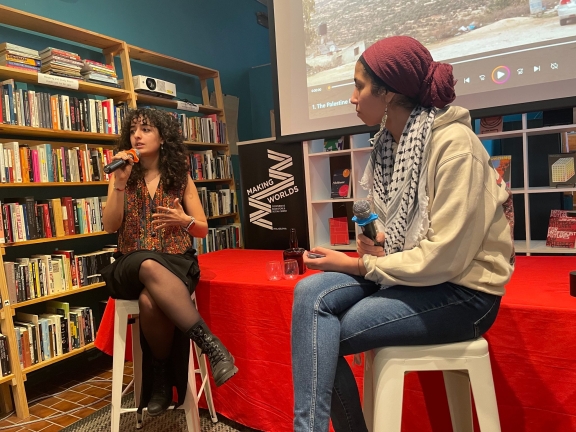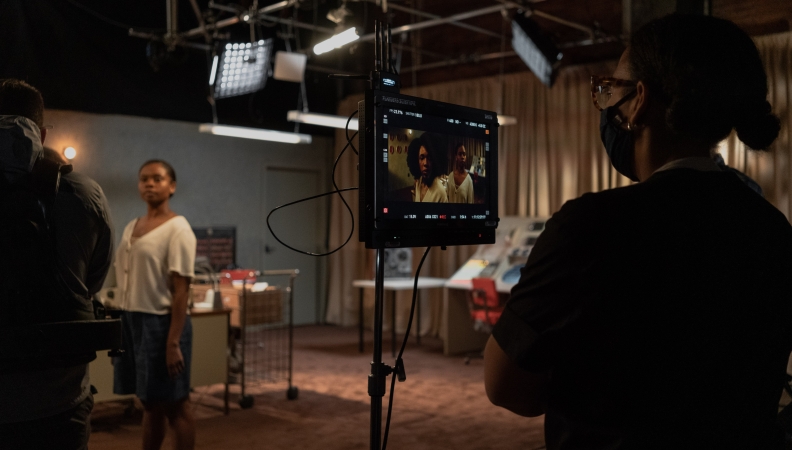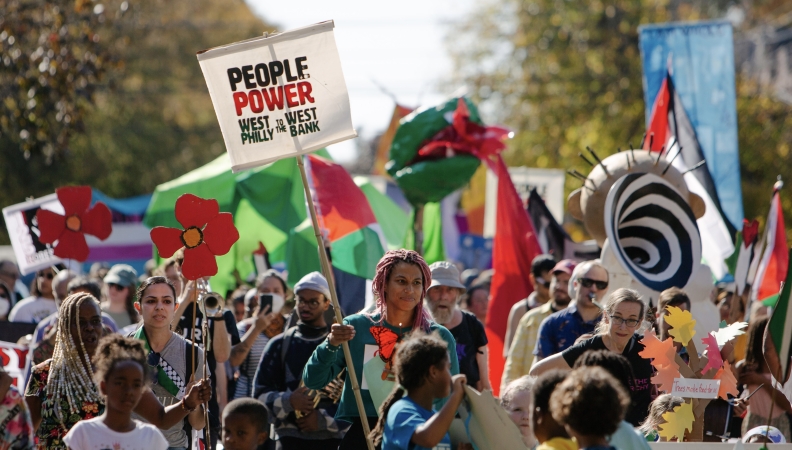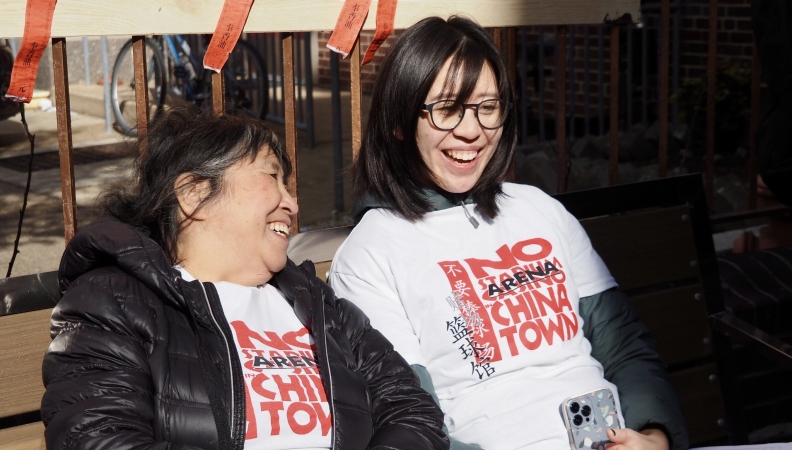Resourcing Narrative Power Towards a Free Palestine

For almost seven months now, I’ve been watching a genocide unfold on my screen via social media. Every day, I watch journalists on the ground in Gaza, who show us complete devastation and incredible resilience while urging viewers to “do something to stop this.”
The tv screen and newspapers around me paint a different picture. For the first few months, local outlets ignored massive protests across Philadelphia. Most news outlets have framed the genocide as a “conflict” between Hamas and Israel, spreading misinformation, omitting context and minimizing the horror inflicted on Palestinian people.
It almost feels like there are two separate worlds. A world where our tax dollars are supporting a genocide and a world where a complicated conflict is happening in distant lands. But one thing is clear: the global outrage around Israel’s war crimes is deeply connected to the information, the stories and images that we have seen.
The crisis is a reminder that we cannot rely on mainstream media to disseminate truth, particularly when doing so challenges U.S. imperialism, colonialism and white supremacy. Instead, consumers of media must practice critical media literacy—something all schools should teach, and seek out more accurate news and information sources.
The reality is that those who disrupt zionist narratives face risks—censorship, backlash, intimidation, loss of employment, funding, targeted violence, etc. But these outlets, institutions and individuals continue to play a critical role, recognizing the power in media and story, and using various platforms to speak out - from podcast studios to film festivals, and even Saturday Night Live. As history has taught us, successful freedom movements create and rely on narrative shifts—a new understanding of what is real, necessary and possible. Filmmakers are a part of this legacy.
IPMF, like other funders who are committed to social justice, recognize that we have a role to play as well in resourcing this narrative work and expanding the audiences for it. Last year, we made grants to three local initiatives, the Palestine Writes Festival, La La Lil Jidar and the Philly Palestine Coalition, and joined several funders in making a public statement demanding a permanent ceasefire.
In March, we partnered with La La Lil Jidar and grantee Making Worlds Bookstore, on a film screening with Dina Amin, a filmmaker from the West Bank of Palestine who is traveling the US sharing her short films. Amin co-founded Space Collective in Ramallah in 2021 and she still runs the art house to support local artists in “amplifying their voices to empower a bigger community fighting through self-expression.” Amin’s films covered a range of topics from remembrance, to resistance and joy. Following the films, community members shared their questions and reflections – and bought posters and artwork donated by La La Li Jadar. The screening raised funds for a local family who is crowdfunding to help their relatives evacuate Gaza.
While visiting Philadelphia, we arranged other opportunities for Amin to engage with our local community. She held screenings with Students for Justice in Palestine at Temple University and high school media makers from POPPYN (Presenting Our Perspectives on Philly Youth News). She also attended an event at Scribe Video Center, which happened to be screening a film by Palestinian filmmaker Carol Mansour. Amin left this city feeling a sense of solidarity, and a recognition that this community values storytelling and movement.
Nurturing narrative work and the region’s community media landscape is something IPMF has committed to since 2019 and we’ve encouraged other funders who care about social justice to join us. Recently, for example, we completed a grant cycle led by and for local filmmakers that awarded grants to 30 film projects. Two of those projects support documentary films that address the struggle for Palestine through two different lenses:

Heather Tenzer is directing a personal film told from the perspective of a Philadelphia woman who grew up in a Orthodox Jewish community that supports Israel unconditionally, "The Rabbis' Intifada" follows the journeys of four Orthodox rabbis as they speak out in support of Palestinian liberation.
Zainab Sultan’s documentary, “Stand Up for Madinah,” follows Delaware's first female Muslim legislator, Madinah Wilson-Anton, as she challenges the Biden administration on the ongoing war in Gaza. When not confronting the establishment, Madinah spends her spare time at local comedy clubs trying to find success as a standup comedian.

While the censoring of narratives toward a Free Palestine continues, the truth is that the world has already seen so much. The stories have touched too many hearts and awakened too many minds. Filmmakers Zainab Sultan and Heather Tenzer are a reflection of this growing tide and below they share insight about their projects, along with their motivations and hopes.
Nuala Cabral: What inspired you to tell this particular story?
Zainab Sultan: As the atrocities started unfolding in Gaza since October, I found myself grappling with a sense of guilt for not utilizing my skills to amplify the voices of Palestinians. Growing up in Saudi Arabia and spending a significant portion of my life in Qatar, I have witnessed firsthand the struggles faced by Palestinians living under occupation. I have seen colleagues lose their families in previous conflicts, further deepening my connection to their plight. It was during this time of reflection that I came across Madinah's viral video from Vice President Kamala Harris' holiday party demanding for a ceasefire in Gaza.
I am drawn to Madinah’s unwavering commitment to her values, particularly in today's turbulent political climate. In many ways, I see myself reflected in Madinah's dedication to uplifting marginalized voices and proudly embracing her identity. I am tired of witnessing the suffering and dehumanization of Palestinians in our mainstream media and by our politicians. As a nation, we have lost our moral compass when it comes to Gaza. So, to me, people like Madinah are a glimmer of hope who are taking risks to speak out against the Biden administration and its genocidal policies. Why is it taking so long for us to convince our government that killing civilians is unacceptable?
Heather Tenzer: I was inspired to tell this story because I wanted to expand narratives around freedom and justice in Palestine. There’s a longstanding mainstream belief that if you are Jewish, you must also be Zionist. That assumption is even more entrenched when it comes to religious Jews: that if you are a religious Jew, surely you believe in a Jewish state. But the religious Jewish anti-Zionist activists of Neturei Karta have resisted Zionism—and spoken out in support of Palestinian liberation—for decades.
I was raised in a modern Orthodox religious Jewish community in the United States, where I had close relationships with Holocaust survivors. In my yeshiva, we were taught that “without Israel, we as Jews would not be safe in the world” and that Palestinians were my enemies. As an adult, I realized that those were myths that had been devised by people who were literally trying to scare and shame us into supporting a colonizing project.Today, I’m a Palestine solidarity activist, the aunt to two Palestinian-American Jewish kids, and one of thousands of American Jews resisting Zionism.
This film is about growing up in an ideological bubble and being indoctrinated into an anti-Palestinian and Arabophobic racist ideology. It’s about unlearning racism and finding allies in unexpected places. I’m making this film in part for Jewish youth who are struggling to make sense of the one-sided Israel story taught to them in Jewish classrooms and other Jewish institutional spaces. As Israel commits genocide in Gaza, I hope this film will speak to religious Jewish Zionist youth who continue to be indoctrinated with anti-Palestinian racist propaganda. I fear that some will buy into the myths that I did, immigrate to Israel, join the Israeli army, and become the next generation of occupiers. And I believe that if they learn an alternative religious Jewish perspective, they might instead stand up for Palestinian liberation, Palestinian lives, and justice.
They might, like others before them, ask: What moral price are we, as a traumatized community, willing to pay to feel safe in the world? And at whose expense do we get to feel safe? And in actuality does Israel—a nation-state with an army and government that prioritizes the rights of Jews over other ethnic groups—keep us safe?
Nuala: What do you hope the impact of this film will be?
Zainab: One of the key things that continues to inspire me as a filmmaker is the impact we can create through our storytelling. We all need to use what is within our power to uplift marginalized narratives, and that is what the film hopes to touch upon. This film came into inception when the onslaught on Gaza began again in October. Through Madinah and her actions, I hope we can reach the American people, who can see the reality of what our tax dollars are doing overseas and how, as a population, we are complicit in this genocide if we don't demand our government leaders to stop this bloodshed. Most importantly, I hope it gives courage to other congressmen and women to stand on the right side of history, because every US bomb that kills a life in Palestine, or for that matter any country in the world, is blood on our hands. And no, it is not okay for our leaders to just say "Sorry! We didn't know better" a decade later.
In addition to that, I firmly believe that Madinah serves as an exceptional role model for young Black and Brown women, particularly within the Muslim community, empowering them to pursue their aspirations, whether in politics, comedy, or both. Lastly, I truly hope the film dispels some stereotypes around Muslim women in America, which have persisted in mainstream media for far too long.
Heather: Since October 7, Israel has unleashed annihilation on Palestinians. It has relentlessly bombed Gaza for over six months—killing more than 33,000 Palestinian civilians in Gaza. I hope the film will spark dialogue about dismantling anti-Palestinian racism, Israel’s human rights abuses in Palestine, and the conflation of Zionism and Judaism. I hope that the film will humanize Palestinians and expand the conversation around Palestine and Israel.
A lot of folks in this country and abroad still think that all Jews – especially religious Jews – support Israel and its policies. Neturei Karta helps to challenge that myth. Many folks tend to think that what is happening in Palestine/Israel is a religious war between Islam and Judaism. And I think Neturei Karta helps to challenge that by talking both about the history of Muslim/Jewish coexistence and about religious texts that prohibit Jews from killing and occupying Palestinians—or any other people for that matter. Neturei Karta comes and says that violence perpetrated against Palestinians is perpetrated by a state that claims to be acting in the name of Judaism but is actually only acting in the name of nationalism. I hope the film will challenge stereotypes about Neturei Karta, Muslims, Palestinians, and Arabs, and about religious Orthodoxy and what it means to be an activist.
I also hope that the film will challenge American Jews—and Americans more broadly—to learn about the history of persecution of Palestinians at the hands of Israel. And I hope that by showing a community of religious Jews who are critical of Israel, more Americans will feel empowered to also critique it—without fear of being called an anti-Semite. I expect the film will inspire conversations about whether Israel, a Jewish state, or any ethno-religious state can ever be democratic. I believe that sharing the suppressed stories of religious Jewish opposition to Zionism and support for Palestinian liberation will be healing for Jewish communities. I trust that audiences will be moved watching scenes of one marginalized community as they speak out in support of justice for ‘The Other’ and model resistance to anti-Palestinian racism.
Nuala: What kind of support do you need to finish this film?
Zainab: As an independent filmmaker, fundraising has been the biggest challenge so far. I have been fortunate to receive support from Scribe Video Center, Bitchitra Collective: Indian Women in Documentary and now, IPMF. I wish more funders were open to supporting short documentaries though.
I would really invite the collective power of the local community to support films that are willing to change the public discourse around freedom and justice, most importantly, around humanity. Also, as a young emerging BIPOC filmmaker, I have always found so much value in my mentors and to have them as a sounding board at different crossroads. If there are folks who would like to get in touch and support the film in any way possible, whether that means a community-led impact campaign, a financial donation, or coming on board as an official advisor to help me navigate the independent doc scene, I am eager to hear from you.
Heather: Fundraising for this film has been challenging. But this story needs to be told, and as independent filmmakers we need to be bold and tell the stories that are being suppressed. We’re excited to get this film out to audiences. Its message is more urgent than ever. We’re grateful to have been awarded a co-production from Al Jazeera Documentary Channel and to have received grassroots support from generous individuals as well as foundations, including IPMF, the Jerome Foundation, and the Jerusalem Fund, among others.
It’s been heartwarming to find support from funders who see the beauty in this project. The struggle against censorship is real: As long as there have been religious Jewish voices opposing Zionism (for over a century), there has been Zionist suppression of these voices: through disinformation campaigns, direct threats, and violent attacks.
We have an incredible board of advisors, comprised of scholars, rabbis, writers, and other filmmakers. We also have a talented crew working to shoot, edit, and produce the film. We require additional financial support to cover these and other costs. We deeply appreciate all forms of support –financial and otherwise–to help cross the finish line.
Nuala: Is there anything else you want to communicate to other filmmakers, film funders and others who read this essay?
Zainab: To all emerging filmmakers, I'd advise that if you have a story to tell, don't limit yourself due to perceived lack of resources. Begin modestly, whether by investing in a secondhand camera or utilizing your phone for filming, but remain persistent. Surround yourself with supportive individuals who are willing to uplift you, and stay true to your inner voice. For film funders, be bold in your choices and don't hesitate to support individuals who may appear less experienced. It's crucial that we invest in a new generation of filmmakers who are driven, but may lack the necessary support to achieve success.
********************
To those interested in supporting the filmmakers interviewed, tax-deductible donations can be made through their fiscal sponsor, Women Make Movies.
To donate to Heather Tenzer’s documentary, “The Rabbi’s Intifada,” go HERE. To follow the film, subscribe to their mailing list on their website or email them at TheRabbisIntifada@gmail.com.
To donate to Zainab Sultan’s documentary, “Stand Up for Madinah,” go HERE. To connect with the filmmaker, email standupformadinah@gmail.com.
********************
Learn more about the other grantee partners referenced in this essay:
La La La Lil Jidar: 20 Years Behind the Apartheid Wall in Palestine, is an urban street media campaign that informs and engages communities in local activism and global solidarity with Palestine.
Palestine Writes is the only North American literature festival dedicated to celebrating and promoting cultural productions of Palestinian writers and artists.
The Philly Palestine Coalition is a Philly-based alliance of Palestinian, Black & Indigenous communities working to uplift Palestinian liberation
Making Worlds Bookstore is a nonprofit cooperative movement-based bookstore and social center located in West Philadelphia with roots in independent book publishing, education, community media and journalism, and organizing.
Scribe Video Center seeks to explore, develop and advance the use of electronic media, including video and audio, as artistic media and as tools for progressive social change.
Presenting Our Perspective on Philly Youth News (POPPYN) is an award-winning social justice media program for high school students in Philadelphia.
Photo Credit: (Photo 1) Nuala Cabral, (2) Heather Tenzer, (3) Zainab Sultan



